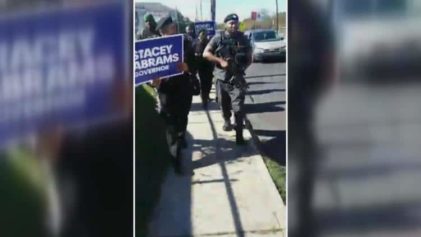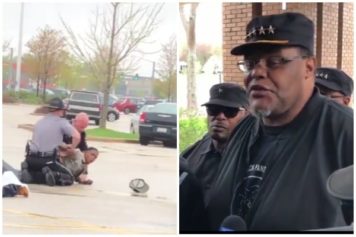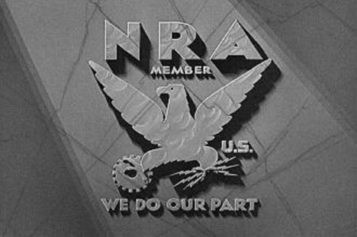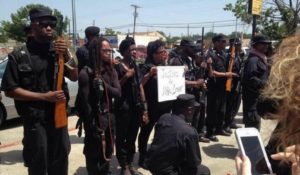
Huey P. Newton Gun Club (Twitter)
In light of the racial violence facing African-Americans — as was most recently seen in the killing of Alton Sterling and Philando Castile by police officers in Baton Rouge and outside Minneapolis — voices in the Black community are once again calling for the establishment of a Black nation within a nation, and Black gun ownership. Neither idea is new, but both are gaining interest and are on the radar screen.
“As far as self-defense, we are a defenseless people and surrounded by a hostile society here in America. I personally think that more than any people, Blacks and African people need to be armed,” Gen. Babu Omowale, national minister of defense for the People’s New Black Panther Party and co-founder of the Huey P. Newton Gun Club, told Atlanta Black Star. “We look at our history in this country. We don’t even need to go back to slavery. Go back to 1863 when Lincoln signed the Emancipation Proclamation. Since that time we’ve been constantly attacked by white society and white supremacy. We’ve never been left alone, so I think it is important for Black people to arm ourselves” he said.
“Being surrounded by white supremacy like we are, we are in the most volatile position of any race in the world,” Omowale noted. “We are here with the most powerful people in the world, the white supremacist nation.”
Throughout the nation’s history and the civil rights era, self-defense and armed resistance were an important part of the Black struggle for freedom. For example, the Deacons for Defense provided assistance to civil rights workers against the domestic terrorism of the Ku Klux Klan. And while Martin Luther King adhered to a philosophy of nonviolence, he relied on armed guards for protection.
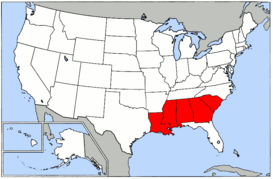
Republic of New Africa
Another aspect of Black empowerment, economic independence and self-determination is the concept of creating a Black nation within a nation. In 1968, a meeting of Black nationalists in Detroit led to the formation of the Republic of New Africa. The RNA called for a traditional homeland in the Southern states of Louisiana, Mississippi, Alabama, Georgia, and South Carolina — subjugated land in which people of African descent were enslaved. Further, the RNA sought reparations of $10,000 for each Black person based on the Reconstruction-era promise of “fifty dollars, forty acres, and a mule” to emancipated slaves.
“The Republic of New Africa based its political, economical, and cultural activities on Ujamaa, a system taken from concepts of family supposedly present in traditional African societies,” according to the Brown-Tougaloo Cooperative Exchange at Brown University.
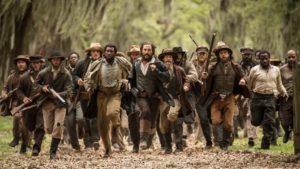
Matthew McConaughey (center) and Mahershala Ali (center left) star in “The Free State of Jones.”
“We’re at a critical juncture of history in terms of race relations, reminiscent of the post-Civil War era,” Victoria Bynum, Distinguished Professor Emeritus in the History Department at Texas State University told Atlanta Black Star.
Dr. Bynum is also the author of The Free State of Jones: Mississippi’s Longest Civil War (The University of North Carolina Press, 2003), a book on Newton Knight, a white Mississippi farmer, soldier and Union sympathizer who united with Confederate deserters and escaped slaves to secede from the Confederacy. Bynum’s book inspired the new film, “Free State of Jones.”
“Clearly, the roots of Black nationalism and separatism are present in the violently white supremacist counter-revolution that destroyed the promise of Reconstruction. Racial segregation, second-class citizenship, a renewed KKK opened the 20th century, setting in motion Black responses that frequently viewed independence and separatism as the only recourse,” Bynum said.
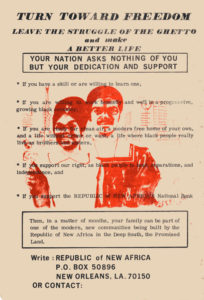
Republic of New Africa Leaflet (Brown University)
Today, there are renewed calls for a Black-controlled land in those five Southern states.
“What we are wanting to do is to have Black people start migrating back to these states. If we migrate 40 million Black people back to these sates, we can control the economy, the education and the politics of these states, and we can do this without the need to fire one bullet,” said Omowale. “And once Black people move in, white people will move out.”
The People’s New Black Panther leader noted that the land is cheaper in these states.
“We can buy land in Mississippi for $5 an acre. We have to stop wasting our money on cars, tennis shoes and rims. We need to be land owners, and this is our way to have a nation within a nation,” Omowale added. “The same way we migrated out of the South after slavery, we can migrate back to the South. Let us be land owners. We have men walking around with $20,000 in their pocket. Let’s buy 20 acres of land in Georgia, let’s buy 20 acres of land in Mississippi.”
Omowale said that when Black people move into these states, they will operate the levers of power.
“The main thing is that we want to control the government in these states. We want Black police officers. We will still have issues and problems, but when you have Black police officers, they are less likely to kill Black people than are white police officers,” Omowale said. “They know our culture and are less likely to gun us down. Building this nation, we will have problems. But it will be worked out over time.”
Further, he explained his view on the nature of law enforcement in America.
“We have to understand who the police are. Their parents and grandparents, many of them are Ku Klux Klan members. They are a part of the same thinking, they are a part of the same households. They join the police to keep an eye on Black people. They are not interested in protecting and serving people but keeping Black people beneath them,” Omowale said, offering that until we have police officers who are interested in protecting Black people, the same problems will continue.
“Police have more equipment now, and they are itching to use Black people as their test subject. It is all about control and subjugating our people. They will keep things in line,” he added.
In addition, when Black people are in control of the educational system, according to Omowale, people can be truly taught about their culture and who they are, and educated to be entrepreneurs and start their own businesses.
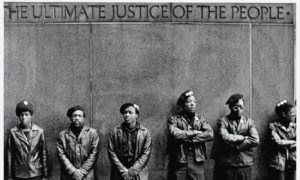
Black Panther Party for Self-Defense
The concept of forming a Black nation within a nation is feasible, according to Christian Davenport, Professor of Political Science & Faculty Associate with the Center for Political Studies at the University of Michigan.
“Actually, I think that it is fairly easily for African-Americans to form a Black nation within the United States. There are large sections of the United States that have nothing but Black people in them already. There are cults and militias as well as private corporations that do whatever they want behind their closed doors,” Davenport, also the author of How Social Movements Die: Repression and Demobilization of the Republic of New Africa (Cambridge University, 2015), told Atlanta Black Star.
“Related to that, from my time in New York and Chicago, it is clear that organizations like the Nation of Islam occupy decent size areas in American cities. The idea of Black folk coming together thus does not seem that difficult to me,” Davenport added. “The Republic of New Africa actually had several innovative ways to seek territorial control. One involved something akin to electoral empowerment whereby Blacks would get individuals elected who would, in turn, deputize and otherwise bring in members of the RNA to govern. Another involved something akin to stepping into situations of state failure. Here, the RNA would find locales where the U.S. government has basically stepped out and/or can no longer maintain control. The RNA had the idea of stepping into this vacuum,” he said. “Now, the difficult part becomes arming that nation in an organized fashion and getting recognition from the United States as well as other nations. This is where the difficulty will come from.”
Meanwhile, underscoring the urgency of the current state of affairs, Omowale believes that things have not changed for Black people since we were emancipated.
“We can just see it more now because of social media, rather than pick up the newspaper and see it days later. The white media is not going to report these things,” he said. “With the invention of social media it is getting things out a lot quicker, and people are seeing things in real time. It has never calmed down; it has never stopped. I don’t think we’re living in better times; we are living in a time when people are being attacked and oppressed,” Omowale added.
Davenport believes there are lessons to learn from the Republic of New Africa regarding the sustainability and practicability of such a nation-building movement.
“Move slow. Do not reveal the plan until it is too late. Keep the organization either open or closed, but do not attempt to do both. Check members carefully, know that the state is monitoring you, and prepare for the worst,” he urged. “Try to follow through with one initiative at a time before moving on. Keep your constituency informed about what you are doing, but recall the point about monitoring.”
“The minute you go aggressive and militaristic, you cannot wind the clock back,” Davenport emphasized. “Nation-building is incredibly hard to do and it involves diverse tasks. Think local, national and global at the same time.”
